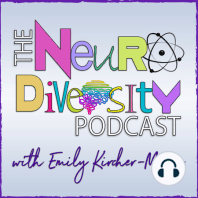42 min listen

ODD - Oppositional? Defiant? Or Just Misunderstood?
ODD - Oppositional? Defiant? Or Just Misunderstood?
ratings:
Length:
33 minutes
Released:
Jun 8, 2023
Format:
Podcast episode
Description
One of the more misunderstood diagnoses in the world of neurodiversity is ODD, or Oppositional Defiant Disorder. We talk with Amelia Bowler, a behavior consultant and author of the book, The Parent’s Guide to Oppositional Defiant Disorder, about the diagnosis, and how to be better at decoding the message that kids are trying to send through their defiance. This is an encore presentation. We’re conducting a two-hour continuing education course for mental health professionals called “Assessing and Treating Suicidality and Self-Injury in Neurodivergent Clients.” You can join online or in-person on June 20th in Chesterfield, MO. Learn more and sign up for either version: Online virtual In-person Join our Facebook group and take part in conversations about this episode and anything related to neurodiversity, and find a like-minded community of open support. Amelia Bowler is an author, an artist, a parent, and a behavior consultant. Growing up twice-exceptional with undiagnosed disabilities gave Amelia some firsthand experience with neurodivergence, and she is now raising a fantastically neurodivergent child of her own. Her book, The Parents' Guide to Oppositional Defiant Disorder, was published in 2020. BACKGROUND READING Amelia’s website The Parent’s Guide to Oppositional Defiant Disorder Instagram
Released:
Jun 8, 2023
Format:
Podcast episode
Titles in the series (100)
Overcoming Perfectionism | Gifted | Intelligence | IQ | 2e: On episode six of Mind Matters, Emily talks with Lisa Van Gemert, the “Gifted Guru,” about perfectionism. We clear up some common misperceptions and discuss strategies to deal with the challenges perfectionism presents. Lisa Van Gemert has written... by Neurodiversity Podcast